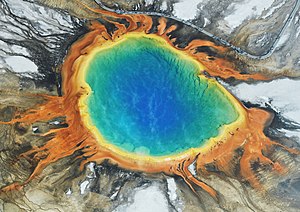
Back Ekstremofiel Afrikaans أليف الظروف القاسية Arabic Extremófilu AST Ekstremofil Azerbaijani Экстрэмафілы Byelorussian Екстремофил Bulgarian Ekstremofil Breton Extremofília Catalan Extrémofil Czech Ekstremofil Danish

An extremophile (from Latin extremus 'extreme' and Ancient Greek φιλία (philía) 'love') is an organism that is able to live (or in some cases thrive) in extreme environments, i.e., environments with conditions approaching or stretching the limits of what known life can adapt to, such as extreme temperature, pressure, radiation, salinity, or pH level.[1][2]
Since the definition of an extreme environment is relative to an arbitrarily defined standard, often an anthropocentric one, these organisms can be considered ecologically dominant in the evolutionary history of the planet. Dating back to more than 40 million years ago, extremophiles have continued to thrive in the most extreme conditions, making them one of the most abundant lifeforms.[1] The study of extremophiles has expanded human knowledge of the limits of life, and informs speculation about extraterrestrial life. Extremophiles are also of interest because of their potential for bioremediation of environments made hazardous to humans due to pollution or contamination.[3]
- ^ a b Merino, Nancy; Aronson, Heidi S.; Bojanova, Diana P.; Feyhl-Buska, Jayme; Wong, Michael L.; Zhang, Shu; Giovannelli, Donato (2019). "Living at the Extremes: Extremophiles and the Limits of Life in a Planetary Context". Frontiers in Microbiology. 10: 780. doi:10.3389/fmicb.2019.00780. PMC 6476344. PMID 31037068. S2CID 115205576.
- ^ Rothschild, Lynn; Mancinelli, Rocco (February 2001). "Life in extreme environments". Nature. 409 (6823): 1092–1101. Bibcode:2001Natur.409.1092R. doi:10.1038/35059215. PMID 11234023. S2CID 529873.
- ^ Shukla, Awadhesh Kumar; Singh, Amit Kishore (2020). "Exploitation of Potential Extremophiles for Bioremediation of Xenobiotics Compounds: A Biotechnological Approach". Current Genomics. 21 (3): 161–167. doi:10.2174/1389202921999200422122253. PMC 7521036. PMID 33071610.